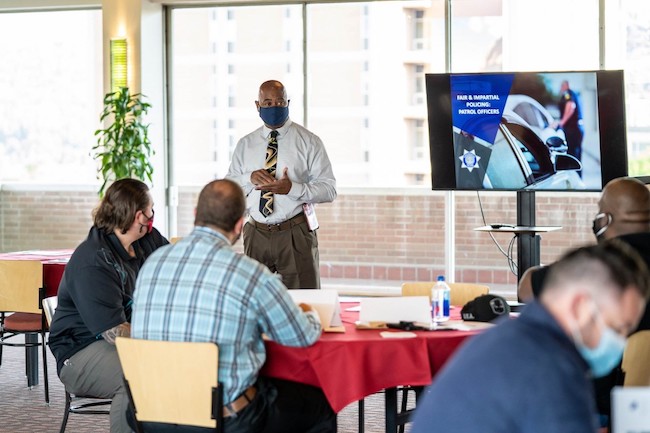
U of U Police Participated in Implicit Bias Training with Community
All University of Utah police officers and command staff participated in an implicit bias training presented by Fair and Impartial Policing.
- By Ralph C. Jensen
- September 02, 2020
All University of Utah police officers and command staff participated in an implicit bias training presented by Fair and Impartial Policing, a company that develops programs based on scientific research and operational tools designed for state, local, and federal agencies in North America.
The training occurred from Monday, Aug. 17, through Thursday, Aug. 20, and included four sessions: One for law enforcement command staff, two for police officers, and one for community members in conjunction with public safety representatives. Themes such as stereotypes, sexism, racism and social injustices were discussed.
“This training is designed to bring attention to implicit biases and to provide officers with tools to help them recognize and address their biases,” explained Scott Cunningham, course instructor with 37 years of experience in the policing profession, who holds a Ph.D. in Adult Education and Organizational Management, and focused his research on policies, ethics, and accreditation. “These sessions focus on helping officers and the community understand that we all have biases, why they exist and what we can do to control our responses.”
Part of the eight-hour training explored the negative consequences of allowing implicit biases to impact one’s actions.
“It is not uncommon for us to hear from officers after conducting this training to let us know that they’ve started to ask themselves, ‘why would I treat this person this way?,’” Cunningham said. “And, they tell us that the situation turned out better because they took the time to acknowledge, question and address their implicit biases.”
To keep the group small to minimize the spread of coronavirus, certain community members were invited to participate in an evening session on Aug. 18. During the four-hour session, students and staff had an opportunity to learn along with police and have a dialogue about the materials presented.
Javier Prado, an international student at the U who attended the community session, believes that opportunities like this help to build a better and stronger system.
“This implicit bias training gave me great exposure to people in positions of responsibility at the U,” he said. “There was room for expressing some very valid concerns about the effectiveness of policing on our campus, and I applaud Chief Rodney Chatman for declaring that this is only the first step in a long path toward a more holistic system of public safety — one that addresses the root causes of distress and instability among students.”
Police Chief Rodney Chatman appreciated members of the community for taking the time to participate.
“This training is just the beginning of building the foundation of our interaction with the community,” he said. “We invited community members because we want to have conversations that builds relationships and allow us to work together. I believe that you cannot police a community if you aren’t a part of it.”
About the Author
Ralph C. Jensen is the Publisher/Editor in chief of Campus Security Today.